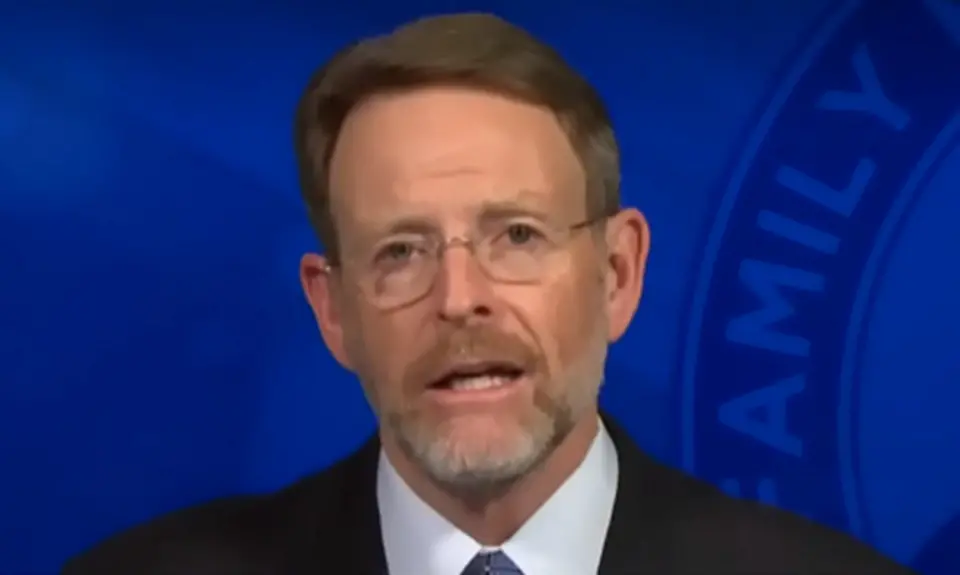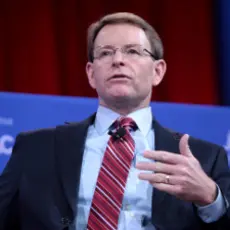Religious-right activists worked with the Trump administration to get language inserted into the recently passed stimulus legislation that could lead to direct taxpayer funding of clergy salaries and other church expenses, which would represent a major advance in the religious right’s long effort to undermine the separation of church and state.
Right Wing Watch reported that on Mar. 19, Sen. Marco Rubio participated in an “urgent pastor briefing” organized by the Florida Family Policy Council. Rubio told the pastors that he had been tasked with establishing a program for assisting churches and other nonprofit groups during the coronavirus crisis by giving them loans to cover operating expenses, like payroll and utilities, and that loans spent on those things would be forgiven, essentially converting the funds into a government grant.
On another pastors call the following day, this one organized by the Family Research Council, President Donald Trump reminded conservative pastors listening how much he was doing for them and called this year’s election day “one of the biggest dates in the history of religion.” He was followed on the call by Vice President Mike Pence, and FRC President Tony Perkins pushed Pence to let the pastors “hear it from your own lips” that he and Trump are “very concerned about the economic impact this is having on churches because of their partnership and the key role the play in the community.”
“Well, we most certainly are,” Pence said, adding that he recognized that when services aren’t held due to churches following government social distancing guidelines or local requirements, “there is a portion of that revenue that just by virtue of people’s habits and practices doesn’t come back.” Pence assured them that the administration’s team on Capitol Hill would make sure Perkins’ concerns were taken care of.
This Monday, an article with details about the provisions appeared on MinistryWatch, a site for donors to Christian ministries that takes a watchdog perspective. It says that churches and nonprofits with fewer than 500 employees are eligible to apply for aid from the Small Business Administration.
Applicants can receive up to 2.5 times their average monthly payroll costs in cash up to $10 million. In the eight weeks following the origination of the loan, whatever portion of the money is spent on covering payroll, mortgage interest, rent, utilities and other specific overhead costs will be forgiven, according to a guide put out by the U.S. Chamber of Commerce. Money spent outside the requirements will need to be repaid starting a year from the origination of the loan with an interest rate of no more than 4 percent over a maximum of 10 years.
Rubio had told the Florida Family Policy Council pastors that his package would offer four times those costs. But even at the lower rate, that could amount to a huge amount of federal tax dollars going to pay preacher’s salaries. And that’s controversial both for progressive pastors—Rev. Timothy McDonald of People For the American Way’s African American Ministers in Action spelled out his objections in Medium—and for some conservative pastors who don’t like the idea of inviting the government into their finances. As Ministry Watch reported:
But should Christian churches and ministries accept the government’s money? John Stemberger, president of the FFPC, told WORLD this is an opportunity for churches to receive much needed aid in the midst of a disaster—and that it’s in the government’s best interest to provide it. “This is not a permanent flow of money,” he said. “They’re not asking churches to become reliant. It’s one-time assistance in an unprecedented environment.” To leave religious nonprofits out of the proposal would have been discriminatory, he said.
Travis Wussow with the Southern Baptist Convention’s Ethics and Religious Liberty Commission told WORLD the bill as it stands has “no strings attached” in restricting religious organizations’ ability to carry out their mission—but that could change when the SBA issues final regulations. Churches may need to consider if they will accept the forgiveness aspect of the program, he said. “That is an area where there could be strings connected, as well as just broader entanglement issues that pastors need to be thinking about.”
Marvin Olasky, editor in chief of WORLD, told me churches may be fine to receive money through the loan program, but pastors and lawyers need to read the fine print. “We sing ‘Blessed be the tie that binds,’ but government ties have strangled some ministries,” he said.
FRC also posted information about the provision on its blog last week, noting, “limitations that the SBA places on loans to religious entities (including a requirement that religious entities show they are not principally engaged in teaching, instructing, counseling, or indoctrinating religion or religious beliefs) are waived.” FRC also took some credit for the provisions, noting, “During Senate negotiations over how best to respond to the economic hardships our country is facing, the FRC team worked to ensure that churches and other religious groups were not left behind and were instead recognized as organizations vital to the coronavirus relief effort—and we will continue to do so going forward.”
The aid to churches was also mentioned on an Intercessors for America prayer call Wednesday, which featured Rep. Mike Bost of Illinois and his wife Tracy. IFA’s Dave Kubal recognized that there is a difference of opinion on whether churches should accept government grants, but he told Bost that he thought it was “cool” that lawmakers thought it was important to support faith communities.
If all this sounds unconstitutional, it’s because it is. But one core strategy of religious-right legal groups in the past few decades has been to weaken the First Amendment’s Establishment Clause by convincing conservative federal judges to reinterpret it in ways that would expand religious groups’ access to public funds. The Establishment Clause has long been held to prohibit federal tax dollars from promoting religion or funding religious proselytizing. But, with the help of conservative judges, religious-right groups have chipped away at that principle, arguing that excluding religious organizations from programs available to other nonprofits is a form of anti-religious discrimination. But they also simultaneously argue that religious groups should get special treatment in the form of exemption of anti-discrimination requirements placed on other nonprofits.
In 2017, the Supreme Court gave religious-right legal activists a big boost in Trinity Lutheran Church v. Comer, a case about whether the state of Missouri could deny a church access to a program funding playground resurfacing based on the state’s constitutional ban on providing direct financial assistance to a church. The court sided with the church. And while the ruling explicitly said the decision applied only to this limited circumstance—resurfacing a playground is a far cry from paying preachers with tax dollars—religious-right activists within and outside the Trump administration are hoping to use that ruling to pry open the doors to government funding for churches, religious schools, and more. There’s a case before the Supreme Court right now that offers justices an opportunity to just that.
It is possible for government to work in partnership with religious organizations to address community needs without crossing an essential line that protects religious liberty. As Rev. McDonald wrote:
Now, let me be clear. I love the church. I’ve been a preacher my entire adult life. I am proud of the role that the black church plays in meeting the needs of our communities. And I support the ways that religiously affiliated nonprofits partner with the government to serve the people.
But I’m the kind of old-school Baptist who believes in the separation of church and state. I think having the government pay clergy salaries would be a terribly divisive idea, one that would generate anger and hostility toward communities of faith and harm the cause of religious freedom.
Our democratic values are most at risk in times of fear and crisis. Sometimes that threat is right in front of the TV cameras, and sometimes it’s buried deep in a bill too big to read. The separation of church and state protects my freedom as a preacher and it preserves genuine religious liberty for all Americans, of every faith and none. Even as we take extraordinary steps to protect one another during this crisis, we should remain vigilant that some will use the crisis to undermine the values we will need to thrive in the long run.








